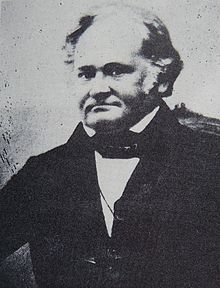Johann Wilhelm Friedrich Höfling
Johann Wilhelm Friedrich Höfling (born December 30, 1802 in Neudrossenfeld near Bayreuth , † April 5, 1853 in Munich ) was a Lutheran theologian. Together with Adolf Harleß, he was one of the founders of the Erlangen School .
life and work
Höfling studied philology and theology in Erlangen. During his studies in Erlangen he became a member of the Bubenreuth fraternity in the winter semester of 1819/20 . In 1831 he was promoted to Dr. phil. doctorate, in 1835 he acquired the theological doctorate. He first worked as a city vicar in Würzburg and from 1826 as a pastor in Nuremberg. In 1833 he was appointed full professor for practical theology in Erlangen.
In 1852, Höfling and Harleß were appointed to the Munich Consistory . Here he was significantly involved in the development of the new agenda ( order and form of the main worship service on Sundays and festive days ) from 1853.
In his most influential book, Principles of Evangelical Lutheran Church Constitution (1850), Höfling developed his so-called transference or delegation theory, according to which the congregation on the basis of its general conception of Friedrich Julius Stahl and others, according to which the ecclesiastical office goes back to a divine foundation Give priesthood to those specially qualified to exercise the ministry.
Works
- Mysticism, the true hist. the nowadays wrongly so-called, in its proportions z. Evangelical Christianity depicted , 1832.
- De symbolorum natura, necessitate, auctoritate atque usu dissertatio , 1834.
- On the Spirit of the Protestant Church , Progr. Erlangen 1835.
- From the composition of the Christian church services, or from the composite acts of communion. A liturgical treatise , 1837.
- From the Feasts or Holy Times of the Christian Church , 1838.
- Justin the Martyr's Doctrine of Sacrifice in the Christian Cult , 1839.
- The doctrine of Irenaeus by the victim in christl . Progr. Erlangen 1840.
- Origines doctrinam de sacrificiis christianorum in examen vocavit , particula I-III, 1841.
- Clemens of Alexandria doctrine of sacrifice in the life and cult of Christians , Progr. Erlangen 1842.
- Tertullian's doctrine of sacrifice in the life and cult of Christians , Progr. Erlangen 1844
- The sacrament of baptism, along with the other related acts of initiation . Dogmat., Hist., Liturgy. shown I, 1846; II, 1848.
- Principles of the Evangelical-Lutheran church constitution. A dogmatic and canonical treatise , 1850.
- The teaching of the oldest church on sacrifice in the life and cult of Christians. Witness interrogation, in a row v. academy. Progrr. employed , 1851.
literature
- Karl Buchrucker: Courtier, Johann Wilh. Friedrich . In: Allgemeine Deutsche Biographie (ADB). Volume 12, Duncker & Humblot, Leipzig 1880, p. 622 f.
- Manfred Kießig: Courtier, Wilhelm. In: New German Biography (NDB). Volume 9, Duncker & Humblot, Berlin 1972, ISBN 3-428-00190-7 , p. 317 ( digitized version ).
- Friedrich Wilhelm Bautz : courtier, Johann Wilhelm Friedrich. In: Biographisch-Bibliographisches Kirchenlexikon (BBKL). Volume 2, Bautz, Hamm 1990, ISBN 3-88309-032-8 , Sp. 925-927.
- Hanns Kerner: courtier, Johann Friedrich Wilhelm . In: Religion Past and Present (RGG). 4th edition. Volume 3, Mohr-Siebeck, Tübingen 2000, Sp. 1829.
Web links
- Karl Buchrucker : Courtier, Johann Wilh. Friedrich . In: Allgemeine Deutsche Biographie (ADB). Volume 12, Duncker & Humblot, Leipzig 1880, p. 622 f.
- Literature by and about Johann Wilhelm Friedrich Höfling in the catalog of the German National Library
Individual evidence
- ↑ Ernst Höhne: The Bubenreuther. History of a German fraternity. II., Erlangen 1936, p. 51.
- ^ Uwe Swarat: Höfling, Friedrich . (1802-1853). In: Helmut Burkhardt and Uwe Swarat (ed.): Evangelical Lexicon for Theology and Congregation . tape 2 . R. Brockhaus Verlag, Wuppertal 1993, ISBN 3-417-24642-3 , p. 923 .
| personal data | |
|---|---|
| SURNAME | Courtier, Johann Wilhelm Friedrich |
| BRIEF DESCRIPTION | Lutheran theologian, co-founder of the Erlangen School |
| DATE OF BIRTH | December 30, 1802 |
| PLACE OF BIRTH | Neudrossenfeld near Bayreuth |
| DATE OF DEATH | April 5, 1853 |
| Place of death | Munich |
